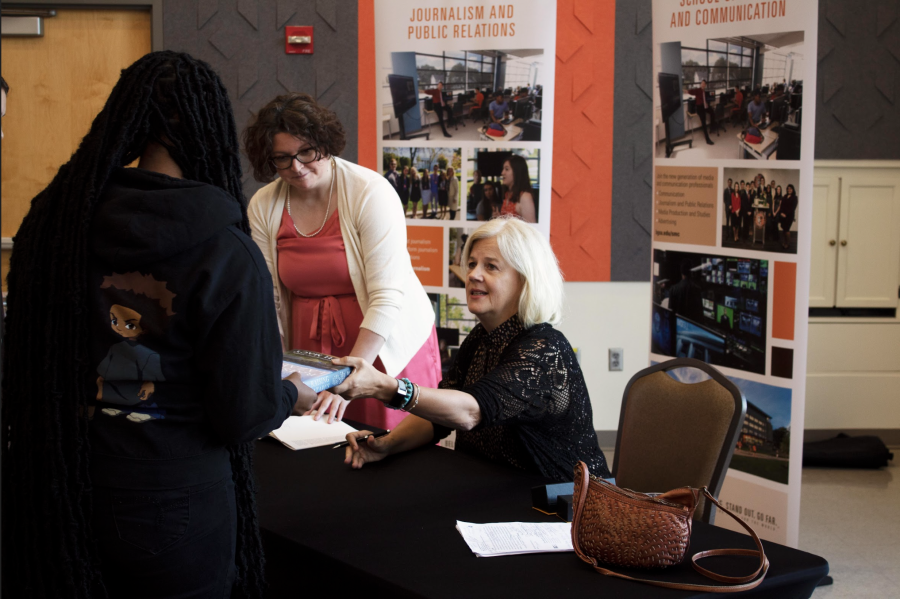Faith Zochowski | Reporter
Beth Macy, class of ‘86, returned to Bowling Green State University on Thursday, Sept. 15 to talk to students and faculty about her life as a journalist.
Her discussion occurred hours before her induction into the 2022 Class of the Academy of Distinguished Alumni, which was held later in the evening.
Macy described her time on campus as a first-generation student. She came from a poor family, went to school fully on Pell Grants and felt like an outsider to her peers. However, these events shaped how she views life to this day.
While starting a story, Macy works her way from the bottom, up.
“I start with the people who are taking out the trash, and I work my way up,” she said.
She credited Vicki Hesterman, her feature writing professor at BGSU, for giving her the knowledge she carried throughout her career. Hesterman helped Macy to be published in Seventeen magazine as a sophomore. She helped Macy find her voice.
“When I write the things I really care about, I kick ass,” Macy said.
Macy attended the Nieman Fellowship at Harvard University in 2010, where she was surrounded by the best journalists in the country and found the confidence to begin writing her own books. She realized these people were not smarter than her, but instead, better connected because of their class status.
After this, she stumbled upon a story idea that became her first novel, “Factory Man,” which is about John Bassett III, a furniture company owner in Galax, Virginia, who sued China in order to keep his company going and won.
“When somebody does something different and wins, that’s a story,” Macy said. “We learn through story, not through data.”
Macy struggled to write her first book proposal, but soon found a team of people to give her the support she needed.
“One of the most important decisions that you’ll ever make is who you choose to partner with,” Macy said. “ You should only want to be with people who love you and who are on your team.”
Macy also wrote “Dopesick,” which follows the opioid crisis in the neighboring areas of Appalachia, Virginia through the eyes of those who are facing addiction. The novel won a L.A. Times Book Prize and was adapted into an eight-episode series on Hulu. The show was nominated for 14 Emmys and won two on Sept. 12.
“Dopesick” surrounds a topic that is hard to write, and one many don’t take on. After submitting the piece to her editor, she received a 6-page, single-spaced letter back that focused on what needed to be different.
Macy reached out to friends to help her organize these thoughts because, at the time, 187 people were dying daily from overdoses. Her support team helped her make sense of the letter and focus on what needed to be done for the story. In order to humanize the number, they told her to write that number down and place a photo of someone she lost from addiction above her computer.
In “Dopesick,” Macy tells part of the story through Tess Henry, a young girl that came from a wealthy family but battled with addiction.
Macy got a call the day after Christmas, where Tess’s mother told her that she had passed. Macy and Tess’s grandfather were the only people to see her body, and she helped the family pick out an urn.
“Sometimes, you just have to put your notebook aside and be a person,” Macy said.
After Tess’s passing, Macy began taking medication for anxiety and depression.She went to a psychiatrist to help her deal with the trauma.
Macy confided in those on her team and was not afraid to reach out to professionals for aid. She knew she needed help, and that they were there for her.
In order to clear her mind, her husband, Tom Macy encouraged her to write a cookbook. Instead, she wrote the solution to the opioid crisis, which is what her latest book “Raising Lazarus” is about.
Macy said the answer to many aspects of life is to have hope and to ask for help. She reflected on the first time she drove up I-75, on her way to BGSU.
“I found that hope here (at BSGU),” Macy said.
To learn more about Macy’s story, visit her website.






